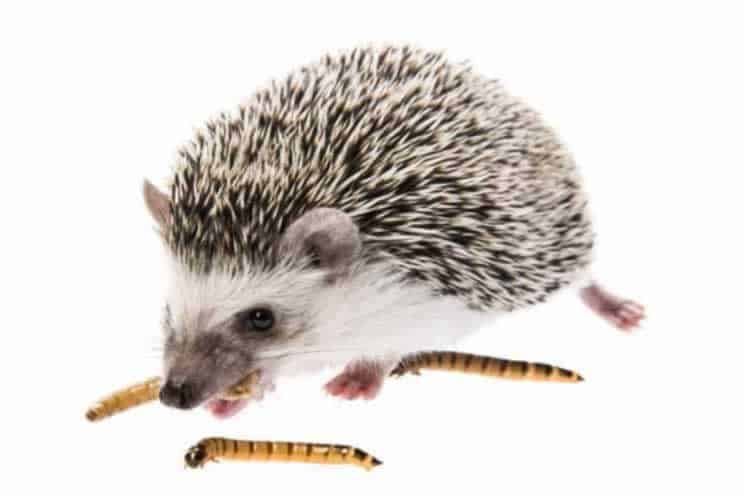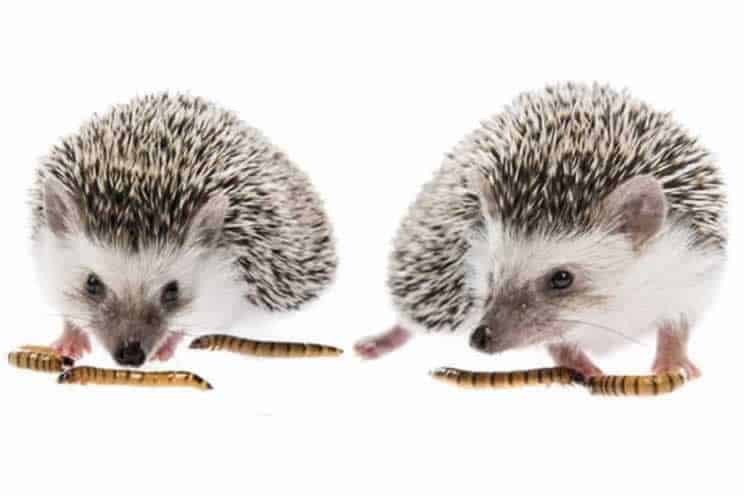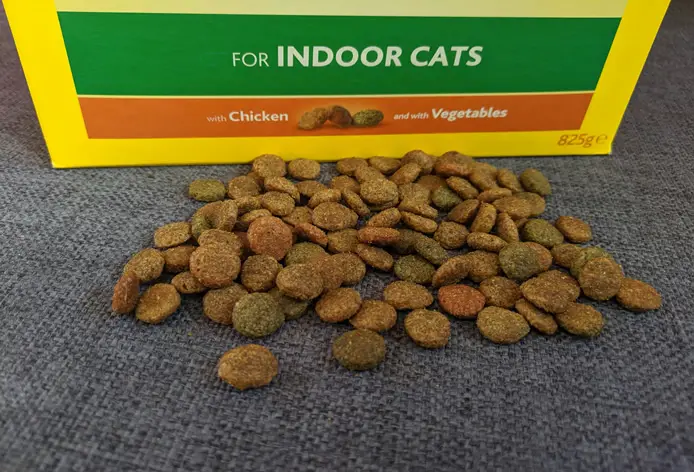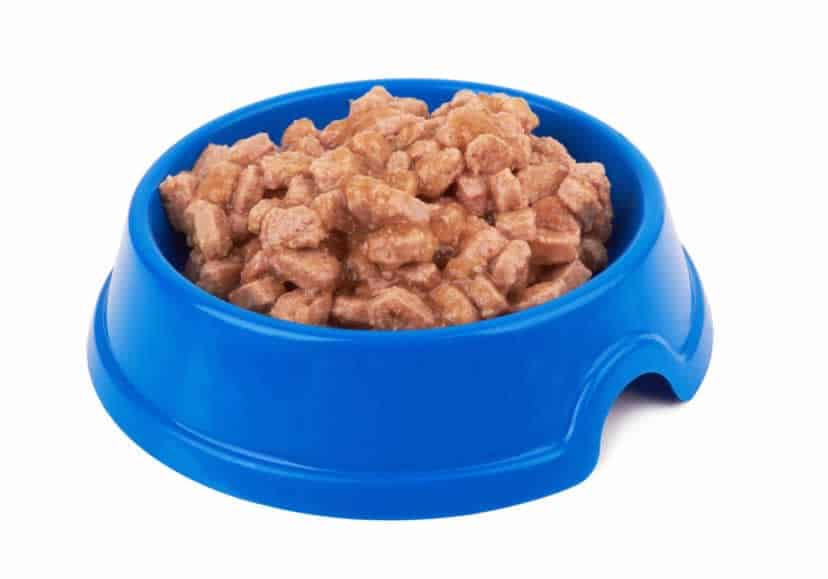
We meticulously check all foods we give our hedgehog to make sure they are safe for him to eat. A hedgehogs diet is important to keep them healthy and free from associated dietary diseases.
What do you feed a Hedgehog? Hedgehogs need to feed on poultry-based dry cat biscuits as a main part of their diet as the poultry-based dry cat biscuits are low in fat with moderate protein. Hedgehogs also need in moderation insects like mealworms or crickets, along with cooked chicken, fruit, vegetables, wet cat food and eggs (scrambled or boiled).
It’s important hedgehogs are fed a diet that is low in fat with a good balance of protein as they are prone to obesity. Obesity can lead to associated diseases like diabetes so sticking to dry cat biscuits as a staple part of their diet, helps immensley controlling their weight.
Here’s a list of the what to feed hedgehogs to ensure they remain healthy.
1. Poultry-based dry cat biscuits
The ideal food for pygmy hedgehogs is dry cat biscuits with their low fat and a healthy amount of protein. Better still, the indoor cat variety of the dry cat biscuits have the right balance of fat, protein along with some fibre.
The indoor dry cat biscuits are designed for cats that will spend most of their time indoors, thereby not expelling as much energy as a cat outdoor as it roams and tries to cat smaller animals.
Watch out for some dry cat biscuits as they can have a lot of fat in them. These can have a much as five times as much fat as the normal indoor dry cat biscuits and we only give these fatty cat biscuits as a treat. If Hynee ate them regularly, his weight would balloon and his health suffers as a result of becoming obese.
Fatty dry cat biscuits
We also give our hedgehog dry cat biscuits which have 20% fat compared to the normal 5% fat but we only do this as an occasional treat. We would never dream of giving these dry cat biscuits to our hedgehog Hynee on a regular basis, as he’d gain a lot of weight and become dangerously obese.
However, giving them very rarely is fine as we do when he’s finished having his bath. Just a way for us to say thank you for making the bath time a pleasant experience and not one where he gets over aggrieved and stressed out.
It’s amazing how if you put two different dry cat biscuits near him, one with 5% fat and the other with 20% fat, the smell from the fattier dry cat biscuit draws him as quickly as moths to a light. He darts across and starts chomping away and it’s almost I can sense him licking his lips as he’s enjoying these biscuits so much.
2. Insects
Pygmy hedgehogs are primarily insectivores feeding on a multitude of insects in the wild but they are also opportunistic and will feed on small frogs, lizards, fruit and vegetables. Their tastes vary on what is on offer and if insects are scarce they will try to seek out alternatives such as fruit.
Insects are a big problem for pet pygmy hedgehogs as they are fattening and can cause weight gain leading to obesity. Pygmy hedgehogs love mealworms and if they could have a choice about what they eat, they would eat these all day long.
Unfortunately, not only are mealworms fattening but they contain a lot of phosphorus which combines with the calcium in the body and leeches the calcium out of their bodies.
The calcium-phosphorus mix ends up being urinated and pooped out, with the loss of calcium causing their bones to weaken. They end up with painful fractures and broken bones, as the calcium deficiency causes their bones to become brittle from osteoporosis type symptoms.
This doesn’t mean pygmy hedgehogs are not allowed to eat mealworms, on the contrary, they need some insects in their diets to get the chitin from the insect which help maintains their spines. So it’s essential to give them insects but ensure they are only fed mealworms and other insects sparingly to minimise the effect of calcium loss from the bodies.

We give Hynee a mealworm or two maybe once a week at most and this seems just enough to give him the benefits of eating insects in terms of chitin but doesn’t overly contribute to his weight as he’ll burn the extra calories off quite easily during his time in his exercise wheel each night.
3. Cooked chicken
When we have roast chicken at home, we cook with it without any seasoning or oils and keep a small piece aside for Hynee with the skin removed (as the skin is quite fattening). When he wakes up, I cut the chicken piece into very small pieces and serve them to him, making sure they are cold.
I also put aside some small pieces of broccoli and give this to him as well, or hold on another day and give it to him a day later (making sure I’ve kept the broccoli in the fridge overnight and then let it get to room temperature before serving).

Other meats like chicken that are lean like turkey can also be given as long as they are cooked and cooled, as in the same way as the chicken. Duck meat may have a lot more fat, so care should be taken if this is given to pygmy hedgehogs by controlling how much is given.
4. Fruit
Hedgehogs can eat fruit but care needs to be taken as some fruit can be toxic to them (more about this below). We feed our pygmy hedgehog Hynee bananas, apples, pears and blueberries. However, we do this moderately, as fruit contains a lot of sugar and too much sugar in a pygmy hedgehogs diet is not a good idea.
As the calories cause weight gain and may interfere with their ability to balance the sugar in their bloodstream, leading to diabetes. Some of these fruits like apples, pears and blueberries will need to be peeled before being served in small cut pieces.
Fruit juices are definitely not advised as these are just concentrated sugar. At least with the whole fruit, there is some fibre to contain the sugar and ensure not all the sugar is absorbed. With fruit juices, it’s just sugary liquid with more sugar per weight than the fruit the juice was juiced from.
Wash any fruit served (with the exception of bananas, as these should be peeled and the insides less the black bit served) as there can be pesticide residue on the fruit and whilst not completely getting rid of the pesticide, it may reduce the amount, as would peeling the fruit.
5. Vegetables
Occasionally we give our pygmy hedgehog Hynee some small pieces of broccoli which provide him with some vitamins. We used to give him small pieces of carrot on the odd occasion but from what I’d read, these are too starchy and difficult for pygmy hedgehogs to digest.
Some leafy greens can also be given, with spinach. Kale and Romaine lettuce is fine. Normal lettuce has minimal nutrients so isn’t recommended, as there’s no point in giving a hedgehog something that’s not their staple food when it has no nutrition.
6. Wet cat food
As an occasional treat, wet cat food (canned cat food) can be given to pygmy hedgehogs as long as the wet cat food doesn’t contain too much fish* or any other meats not suitable for pygmy hedgehogs.
It shouldn’t be used as a main staple food for the pygmy hedgehogs as it can contain more fat than required and also the level of protein may not be sufficient. Wet cat food generally is canned or can come in plastic tubs and we always make sure it’s in date before giving any to Hynee.
I’ve struggled to find out why fish is not recommended for hedgehogs and the only reasons seem to be pygmy hedgehogs don’t tend to eat this in the wild and it creates smellier poops, other than that if it’s a minor ingredient in wet cat food then it should be ok as long as the wet cat food isn’t given regularly other than a treat.
If there is a change in the hedgehog’s poop or health then it makes sense to stop using cat foods with fish in them.
There’s a lot of other stuff added to wet cat food, mostly as bulking agents and this can include:
- Potato Starch;
- Tapioca Starch (from cassava);
- Carrageenan (from seaweed);
- Guar Gum;
- Xantham Gum;
- Locust Bean Gum (from Carob tree seeds); and
- Agar (from seaweed).
Some of these ingredients could cause digestive issues and irritate the digestive tract as well as causing inflammation and this could be painful for pygmy hedgehogs. I always thoroughly check the ingredients of wet cat food to see if it’s not loaded with these fillers and bulkers.
Wet cat food isn’t necessarily raw food and has been processed in some way to make it safer for cats to eat, so it should be fine in moderation for pygmy hedgehogs.
7. Scrambled and boiled eggs
Scrambled eggs are a good source of protein for pygmy hedgehogs and we’ve given Hynee scrambled eggs on some occasions. It’s important to make sure the egg isn’t cooked with any oils or butter or is seasoned.
By cracking the eggs and mixing them and then pouring the mixed eggs onto a plate, microwaving can help avoid the use of any other ingredient like oils.
We’ve also tried boiled eggs and Hynee has happily eaten this, however, we’ve made sure any eggs including scrambled and boiled eggs have been allowed to cool to room temperature before being cut into small pieces and then served.
Foods not to give to Hedgehogs
So far I’ve discussed the foods we tend to give to our pygmy hedgehog Hynee and now I’m going to discuss foods that should not be fed to a hedgehog, as they can cause digestive issues or can be toxic or can causes diseases like diabetes, fatty liver disease and cancers.
This is not a definitive list and further research needs to be done on the safety of any new food introduced to a pygmy hedgehog.
(i) Hedgehog formulated foods
Be very careful in feeding a pygmy hedgehog, foods that have been formulated for hedgehogs as these can tend to be formulated for a different species of hedgehog instead of a pygmy hedgehog.
As a result, some of the ingredients may be too fattening, as well as there being too much protein and other ingredients that aren’t agreeable to pygmy hedgehogs.
A lot of these hedgehog formulated foods are designed for hedgehogs who will undergo hibernation and as a result, their dietary requirements are required to fatten them up for their survival during hibernation and with a pygmy hedgehog, there should be no hibernation so they don’t need the extra fat.
If the food is specially formulated for pygmy hedgehogs and contains the correct fat and protein nutritional contents then this could be fine, as long as there are no other ingredients that could put the pygmy hedgehog at risk.
(ii) Seasoned foods
Anything that’s been seasoned should not be served to pygmy hedgehogs, it should be cooked as is and then cut into small pieces before serving. A hedgehogs palette isn’t like ours where they need the seasoning to add to the flavour, they’ll just eat it even if it’s bland and tasteless. To them, as long as it smells tasty then it’s worth eating and cooked chicken for example, without seasoning, will still smell tasty.
(iii) Dairy
Hedgehogs generally are lactose intolerant as they do not possess the enzyme to break down lactose in milk and associated dairy products. As a result of this their digestion suffers, when ingesting milk.
Anything with milk should be avoided and it’s imperative to check the ingredients for any traces of hidden milk, even if it’s something as innocuous as oatmeal used in their bathwater (oatmeal is put into a sock and then put into the bath, allowing the moisturising effects of oats to disperse into the bathwater).
As this oatmeal sometimes can contain powdered milk, so if the pygmy hedgehog ends up drinking bathwater, they are also drinking any milk residues in the water.
Serving pygmy hedgehogs food cooked with dairy products like butter and lards, for example, is also a big no-no as these foods will end up absorbing the lactose and then cause the hedgehog problems when eaten.
(iv) Supplements
Don’t give pygmy hedgehogs any supplements like vitamin supplements without understanding the potential damage they could do. Some supplements containing vitamins can become toxic if given regularly to pygmy hedgehogs causing organ damage.
The problem arises two-fold, first, some vitamins are fat-soluble like Vitamin D, so if there’s not enough in the diet then the vitamin can’t be absorbed. Second, some vitamins like Vitamin A and Vitamin D can’t be easily expelled by the body, so there is a risk they can build up in the body into toxic concentrations, leading to damage to bodily organs.
I never supplement our hedgehog’s diet with any vitamins as the food we give him is perfectly balanced to give him all his nutritional needs and I would not want to end up damaging his health and causing him pain and suffering.
(v) Raw meat
Any meat given to pygmy hedgehogs must be cooked and then allowed to cool before serving. Pygmy hedgehogs don’t need raw meat as part of their diet and it’s vital to avoid raw meat completely as it can pass on harmful bacteria to pygmy hedgehogs, making them ill or worse, be fatal.
There’s not only the risk of salmonella poisoning but also campylobacter, another dangerous bacteria. Always wash your hands after handling raw meat as this bacteria can easily spread from contact, including to a pygmy hedgehog by touch when handling them.
Wet cat food isn’t necessarily raw meat and is generally fine as it’s been cooked in some way. As long as the meat is suitable for pygmy hedgehogs then this should not present a problem.
(vi) Raw vegetables
Vegetables can be hard for pygmy hedgehogs to digest so it makes a lot of sense to cook them first. We steam our vegetables thus avoiding any oils or dairy such as butter used in alternative cooking methods.
We let the vegetables cool down to room temperature before cutting them into very small pieces. The cooking breaks down the starch in some of the vegetables making it easier for hedgehogs to digest.
Raw carrots, for example, would be difficult for pygmy hedgehogs to digest but cooked carrots could be a lot easier, as they will be a lot softer. Raw vegetables can also increase the choking risk, as the hedgehog may find it hard to break the vegetable down and end up swallowing a piece which obstructs their airways.
When I see Hynee eat dry cat biscuits, I can see why these are such a safe food for him to eat, as he chomps on the biscuits, causing it to disintegrate easily into many tiny pieces, making it easier to swallow.
However, some foods like raw carrots would not be easily chomped on and broken down, causing a risk of larger pieces being swallowed and causing a blockage to a hedgehogs airways.
(vii) Raw eggs
It’s important not to give pygmy hedgehogs any raw eggs as this increases the risk of them getting Salmonella poisoning. I only give our hedgehog Hynee cooked eggs free off seasoning, dairy and oils. I find it easier to boil eggs and then once the egg has cooled down, I cut into tiny pieces for Hynee.
(viii) Toxic Vegetables
Some vegetables can be toxic to pygmy hedgehogs and should be avoided at all costs. These include onions, garlic, tomatoes, certain mushrooms, celery to name a few and these can cause organ problems if eaten by pygmy hedgehogs.
Other vegetables whilst not toxic are not recommended either because they can difficult to digest or a highly calorific (causing weight gain), these include corn that’s difficult to digest and potatoes that are highly calorific.
Other vegetables can upset the balance of minerals in a pygmy hedgehog, like peas, which upsets the phosphorous calcium balance leading to calcium being leached out of the body, the same way too many insects in the diet would also do.
(ix) Toxic Fruit
Fruit can also be toxic, fruits such as grapes, raisins, avocados, pineapple, oranges, lemons, limes to name a few should be avoided. Their toxicity can cause organ problems in pygmy hedgehogs and therefore safer fruits like apples, pears, bananas, blueberries, strawberries and watermelon should be given instead.
To be sure the fruit given to a hedgehog isn’t causing them any problems, even if it’s a safe fruit as mentioned above, start by giving a small amount of fruit and check over the course of the next few days if there being no change in their poop.
If it isn’t dried out solid pieces but is more diarrhoea like or is a different colour than normal, then remove the fruit and don’t introduce anything new until their poop has returned to its normal state.
(x) Fatty and salty foods
Pygmy hedgehogs will eat pork but this should be carefully controlled if it can’t be avoided, as pork is fattier than other leaner meats and is also quite salty, so introduces a lot more sodium into their diet.
I’ve mentioned duck earlier as this can be fattier than chicken and turkey, duck is also available in many wet cat foods, so due diligence is required to ensure the overall fat content of the canned cat food isn’t too high.
Best foods to feed an Hedgehog
A good diet with a good combination of low-fat food with protein control is dry cat biscuits and this should be the staple diet of any pygmy hedgehog kept as a pet. We feed our hedgehog Hynee these every day and always make sure his food bowl has an adequate supply of these biscuits for the night ahead.
Hedgehog feeding essentials
Before I go into the detail of what can be fed to a pygmy hedgehog, I’m going to discuss two important basics of the feeding essentials for a pygmy hedgehog. These essentials are a low-fat diet with protein control.
(i) Low-fat diet
Hedgehogs need a diet low in fat when they are kept as pets, as they can put on weight very quickly. Any food given to pygmy hedgehogs must be carefully checked for nutritional value to ensure it’s not fatty, so to minimize on the pygmy hedgehog ending up gaining weight unnecessarily, potentially leading to obesity and health issues.
We aim for the fat content of between 5% to 15% in the foods we serve him on a regular basis, with other foods occasionally served, have a much higher fat content and these are served as rare treats only. Some owners do misunderstand the dietary requirements of pygmy hedgehogs and inadvertently feed them a higher fat diet and then end up with an obese and unhealthy hedgehog.
As pets, pygmy hedgehogs are not going to be as active as they are in the wild even if they have an exercise wheel, so in the wild, the pygmy hedgehogs can eat more fat as they forage several miles a night searching for food.
In the process burning off a lot of calories and food may not always be available, so they’re eating won’t be as regular as when they are kept as a pet. They are an opportunistic eater in the wild and when more food is available they may eat more to compensate for the lean times of food scarcity whilst when kept as pets there are no lean times, food is always available.
(ii) Protein control
The protein in a pygmy hedgehogs diet needs to be controlled with a balance of 30 to 35% being a good amount, as too much protein will put a strain on their organs especially the kidneys and liver to remove the excess protein out of the body.
In the wild, they can eat more protein and this is because the protein source, predominantly insects contain not only protein but water. The water helps expel the excess protein through the pygmy hedgehog’s urine and faeces before it gets an opportunity to be processed by the organs.
Whilst a lot of pet foods contain concentrated amounts of protein without the water to help flush the excess protein away.
On the flip side a lot of wet pet foods contain an average amount of protein but because they are wet foods instead of being dry, not enough of the protein ends up being absorbed by the pygmy hedgehog. As it passes through their body with the water in the wet food, leading to a protein deficiency.
Conclusion
We feed our pygmy hedgehog Hynee predominantly dry cat biscuits, with occasional pieces of cooked chicken (unseasoned, cooked without oils or butter) and occasionally give him mealworms, bananas, apples or blueberries.
I’d say 95% of the time our pygmy hedgehog Hynee eats dry cat biscuits with the other 5% of the time, he’s given other food, essentially as a treat and in moderation to ensure he doesn’t end up gaining unnecessary weight.
Pygmy hedgehogs are insectivores by nature but when kept as pets many owners feed them a more omnivorous diet which includes some fruit and vegetables. Keeping a pygmy hedgehog healthy is the most important consideration when deciding what to feed them.
Related Questions:
How long can hedgehogs go without food? We haven’t tested this and wouldn’t want to but it’s believed they can survive without food for around 10 days. I think there’s been some controlled testing that’s been done to validate this, which seems a bit cruel to test a theory. However, I think the reason they can survive this long without food, is because they’ve evolved to do this as in the wild food may not always be available in plentiful supply, so there could be prolonged gaps between feeds.
Can hedgehogs choke? Choking is a serious problem for pygmy hedgehogs and any food served to them must be easy for them to break down and eat. Foods like dry cat biscuits can be easily broken down by biting but foods like raw carrots are very difficult to break down and can potentially block their airways when swallowed leading to choking.



